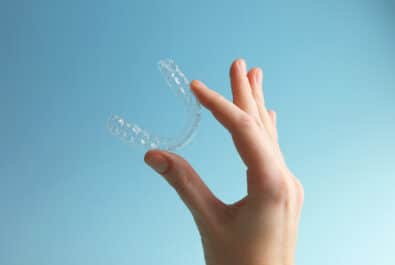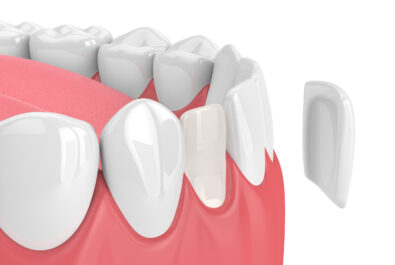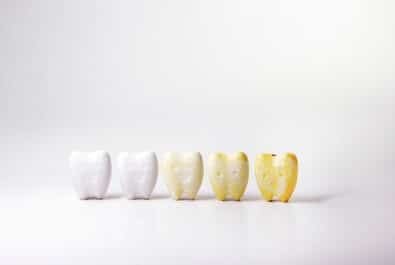If you’re like most people, you may not exactly look forward to visiting the dentist, but it also doesn’t cause you any overwhelming distress either. However, there is a smaller but significant portion of the U.S. population that has such negative emotions associated with the dentist that they avoid receiving dental care until a problem has reached an emergency stage. Today, we’re examining three commonly cited causes of dental fear and looking at how sedation dentistry can help alleviate those unpleasant emotions. (more…)
Porcelain Veneers: An In-Depth Look at a Cosmetic Superstar
The very meaning of the word “veneer” seems to suggest something superficial and lacking in substance. In practice, this couldn’t be further from the truth. Porcelain dental veneers look beautiful, can disguise a wide range of esthetic flaws, and have the strength and durability to withstand constant use. Today, we’re taking an in-depth tour of this handy little cosmetic restoration to help you decide whether veneers might be the right treatment option for you. (more…)
Gum Disease and Bone Loss: A Destructive Relationship
By the time gum inflammation progresses into full blown periodontitis (literally “an infection of the area around the tooth), a serious bacterial infection has established itself far below your gum line. Your body – specifically, your immune system – senses the presence of infection and responds as it’s supposed to. It attempts to protect the body at large by destroying the infected part of the body, in this case the gums, connective tissues, and alveolar bone (the pocket of bone that anchors the teeth roots). In pictures taken with advanced dental imaging, like digital x-rays and CT scans, the atrophied bone visibly draws away from the tooth, revealing the darker tooth roots. (more…)
The Sounds of Science: Noises You May Encounter at Your Dentist’s Office
The American Dental Association estimates that as many as 40 million Americans avoid receiving professional dental care because they find visiting the dentist extremely unpleasant. Dental fear and anxiety can be prompted by a number of factors, including unpleasant memories of the dentist, a fear of losing physical control, the influence of friends and family members who dislike dental care, and a general distaste for the sensations associated with dentistry. It may come as a surprise to people who don’t have a problem seeking out dental care, but even the sounds one encounters in a dental office can make some patients extremely uncomfortable. Today, we’re taking exploring a few potentially unsettling sounds you might hear at your next appointment, and what you can do to stay relaxed despite the noise. (more…)
3 Things You Didn’t Expect to Deal with After Dental Implant Surgery
No matter how much research you do on your own, no matter how detailed your initial consultation with your dentist, you still have quite a few surprises in store for you once the your new dental implants and the temporary crown, bridge, or denture are in place.
1. You’ll Have to Eat a Modified Diet for a While
The marketing doesn’t lie: dental implants do help restore nearly 100% of your normal chewing ability (depending on the number of missing teeth you had replaced). What the marketing doesn’t mention is (more…)
Are Dental Implants the Key to a Longer, Healthier Life?
Endless commercials advertise creams that promise to erase wrinkles. Magazine and web articles applaud celebrities who manage to look as fresh and young as they did a decade ago. Despite our cultural obsession with a youthfulness appearance, most regular people want to recapture the feeling of being young rather than the just the looks. As we enter our middle and later years, we tend to lose the spring in our step, our ability to enjoy the same foods as we did in our youth, and that confidence that comes with feeling healthy and vibrant. The loss of one or more of your permanent teeth accelerates the aging process, resulting in poorer diet and poorer overall health. Although dental implants won’t have you looking like you did during your college years, they can help you recapture a youthful sense of wellbeing. (more…)
How Much Does It Cost to Have Your Wisdom Teeth Extracted?
When facing the prospect of any dental procedure, from a simple cleaning to oral surgery, cost is always an important thing to consider. Knowing how much of an impact a procedure will make on your finances can relieve undue financial stress, but the exact out-of-pocket cost of your specific treatment plan can vary according to factors, including:
The Type of Extraction You Need
As the name suggests, simple extractions are relatively straightforward, can often be performed using only local anesthetic and nitrous oxide, and require little downtime. Surgical extractions, on the other hand, are usually performed under oral or IV sedation and require at least 1-3 days of recovery time afterward. As you can probably guess, a complex surgical extraction (which most wisdom teeth removals are) will involve a higher cost than a simple extraction. (more…)
How to Recover Faster After a Wisdom Tooth Extraction
Making the choice to have your wisdom teeth (or your child’s wisdom teeth) removed is a proactive step toward preventing serious oral health problems, like severe gum infection, tooth decay, and gum disease. Before reaping the long term benefits of wisdom teeth extraction, you need to follow your dentist’s post-operative instructions to the letter to ensure that the extraction sites heal properly. In addition, you can follow our handy guide to help hasten the healing process after a surgical extraction. (more…)
The Practical Side of Cosmetic Dentistry
Cosmetic. The word evokes thoughts of makeup and Botox injections and other little luxuries that, while certainly fun, are not essential to living a healthy, prosperous life. In America, we place a great deal of importance on how we look even as we scoff at people who spend “too much time” taking care on their outward appearance. While it may not correct this little cultural hypocrisy, cosmetic dentistry is one of those few areas that straddle the line between looking beautiful and healthy and being beautiful and healthy. (more…)
Salivation Celebration: How Spit Sustains a Healthy Smile
It’s a little gooey, a little gross, and oh-so important for maintaining a healthy oral environment. It’s saliva, that wet stuff that flows through your mouth throughout the day and, although we take it for granted, spit is full of surprises. Saliva changes constantly, helps you perform a wide array of vital activities, and even repairs minor tooth damage.
What is Saliva Made of?
It’s probably no surprise that human saliva is comprised of 99.5% water. What is surprising is the complexity of the remaining .5%. In addition to water, saliva contains a wealth of (more…)














